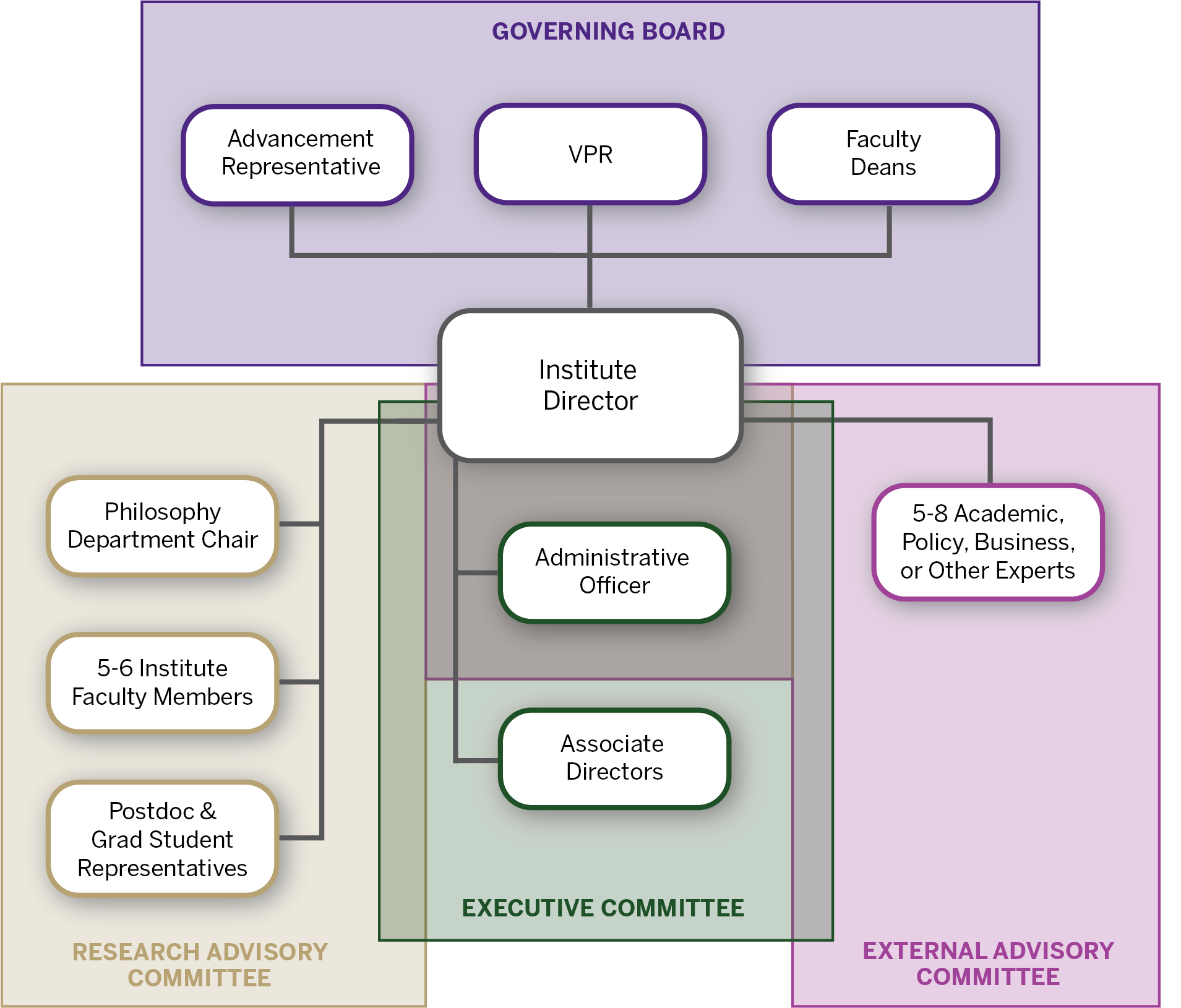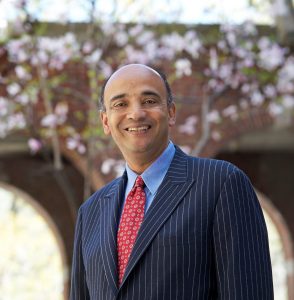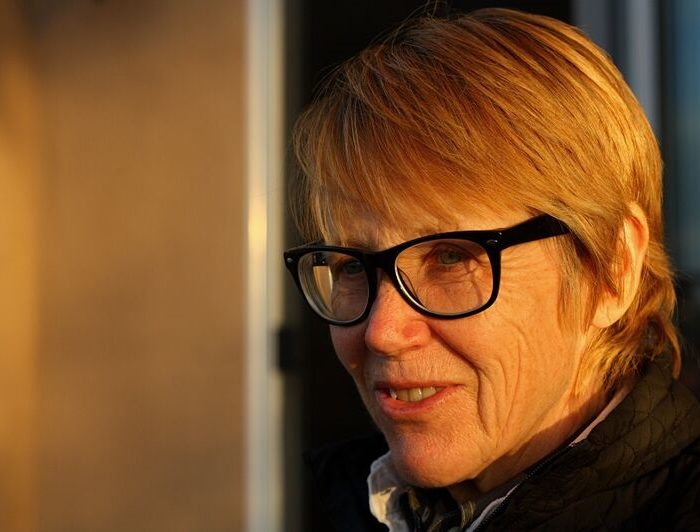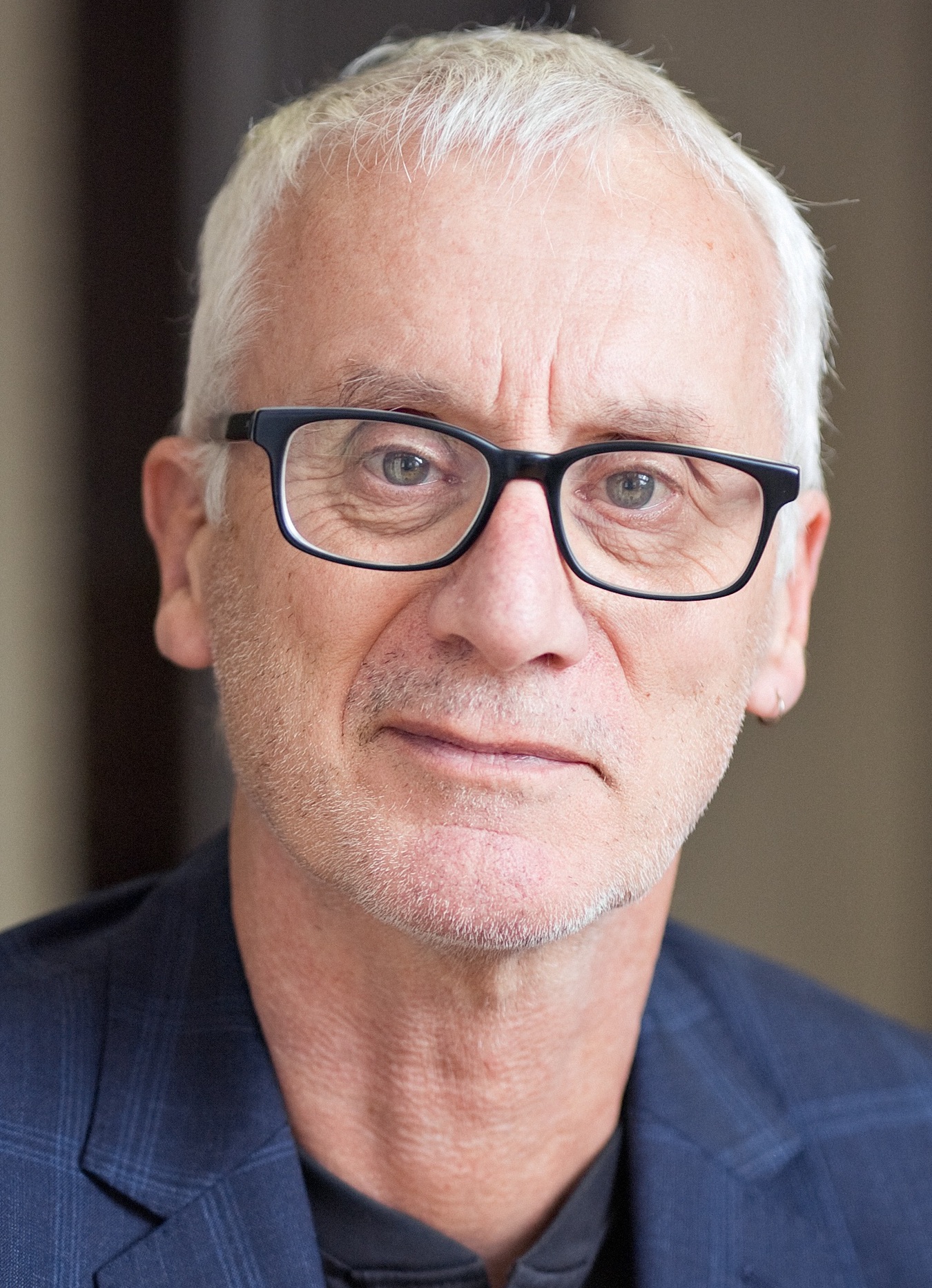Institute Governance
Governance Structure | Director & Associate Director | Executive Committee | Research Advisory Committee | External Advisory Council

Governance Structure
The Director of the Rotman Institute reports to Western Research’s Governing Board, an Advisory Board, a Research Advisory Committee, and an Executive Committee. The Governing Board, chaired by the Vice-President Research (or designate), provides sign-off authority on Institute programs, annual approval of the budget, and review of vision, strategy, and metrics for evaluating success.
Institute Director
The achievement of the Institute’s Vision and Mission constitute the Director’s primary responsibility, all within the greater context of their university appointment. The Director is appointed to a renewable five-year term, and reports to the Vice-President (Research), who has responsibility for oversight of the strategic plan and the Institute’s budget.
Associate Director(s)
Associate Directors are Institute faculty members at Western, nominated by Institute faculty. Appointments are made by the Vice-President (Research) based on the recommendation of the Institute Director. Associate Directors are responsible for advising and supporting the Director in operationalizing and implementing strategic priorities via research programs, events & activities. Each takes leadership of a particular portfolio.

Pictured Above: Dan Lizotte, Institute Director from 2024 – present.
Executive Committee
The Executive Committee provides oversight on the day-to-day operations of the Institute, including, but not limited to: management of administrative personnel; allocation of funds and budget oversight; the planning and hosting of conferences, workshops, speakers series at the Institute; and the administration of other Institute initiatives and activities. View the Western Research Institutes Executive Committee Terms of Reference Guidelines.
Dan Lizotte, Institute Director
Jann Paquette-Warren, Director, Western Research Institutes (ex officio)
Chris Smeenk, Associate Director
Maxwell J. Smith, Associate Director Public Affairs
Francesca Vidotto, Associate Director Quantum Information Structure of Spacetime
Research Advisory Committee
The Research Advisory Committee provides input & advice from the broader research community to the Executive Committee and the Director on topics including, but not limited, to: research priorities; selection of visiting scholars; recruitment and appointment of postdoctoral fellows to the Institute; training programs; promoting leadership in informed public debate of policy issues related to science; and promoting public engagement on issues in science. Current Research Advisory Committee members are listed below. View the Western Research Institutes Research Advisory Committee Terms of Reference Guidelines.
Dan Lizotte, Institute Director
Chris Smeenk, Elected Member – Philosophy
Benjamin Chin-Yee, Elected Member – Schulich School of Medicine & Dentistry
Jacqulyn Burkell, Ex Officio Member – Faculty of Information and Media Studies
Corey Dyck, Ex Officio Member – Philosophy
Adam Koberinski, Elected Member (Postdoc Representative) – Philosophy & Physics
Owen Chevalier, Elected Member (Graduate Student Representative) – Philosophy & Psychology
Saher Panjwani, Elected Member (Graduate Student Representative) – Philosophy
Francesca Vidotto, Elected Member – Philosophy & Physics
Maxwell J. Smith, Elected Member – Health Sciences
Bipasha Baruah, Elected Member – Gender, Sexuality and Women’s Studies
Alissa Centivany, Elected Member – Faculty of Information and Media Studies
Georgia Mouroutsou, Elected Member – Philosophy
Jann Paquette-Warren, Ex Officio member – Director, Western Research Institutes
Pascal Rodríguez-Warnier, Elected Member (Graduate Student Representative) – Philosophy
External Advisory Council
The Institute’s External Advisory Council includes distinguished and respected academic experts of international stature in disciplines relevant to the Institute’s Vision and Mission. Current External Advisory Council members are listed below. View the Western Research Institutes External Advisory Council Terms of Reference Guidelines.

Kwame Anthony Appiah
Professor of Philosophy and Law at New York University;
Dr. Kwame Anthony Appiah is Professor of Philosophy and Law at NYU. Professor Appiah was born in London, where his parents met, but moved as an infant to Kumasi, Ghana, where he grew up, and where his three sisters were born. He took BA and PhD degrees in philosophy at Cambridge and has taught philosophy in Ghana, France, Britain, and the United States, with professorships at Yale, Cornell, Duke, Harvard, and Princeton. He explored questions of African and African-American identity in In My Father’s House: Africa in the Philosophy of Culture; examined the cultural dimensions of global citizenship in Cosmopolitanism: Ethics in a World of Strangers; investigated the social and individual importance of identity in The Ethics of Identity; and has written other books, including one about W.E.B. DuBois and another about the idea of honor. (He’s also written three mystery novels.) He has been President of the PEN American Center, the Modern Language Association, the Eastern Division of the American Philosophical Association, and the American Academy of Arts and Letters, and serves on the Board of the American Academy of Arts and Sciences, the New York Public Library and New York’s Public Theater. In 2012 he received the National Humanities Medal from President Obama. His most recent book is The Lies that Bind: Rethinking Identity.

Nancy Cartwright
Professor of Philosophy at Durham University;
Co-Director of the Centre for Humanities engaging Science and Society at Durham University;
Distinguished Professor at the University of California, San Diego;
Dr. Nancy Cartwright FBA FAcSS is Professor of Philosophy at Durham University and a Distinguished Professor at the University of California, San Diego (UCSD). In the first half of her career at Stanford University she specialised in the philosophy of the natural sciences, especially physics; in the second half, at the London School of Economics and now Durham and UCSD, she has specialised in philosophy and methodology of the social sciences with special attention to economics. Her current research focusses on objectivity and evidence, especially for evidence-based policy.

Judy Illes
Professor of Neurology at the University of British Columbia;
Disintguished University Scholar & UBC Distinguished Professor in Neuroethics;
Director of Neuroethics Canada;
Dr. Judy Illes is Professor of Neurology, Distinguished University Scholar, and UBC Distinguished Professor in Neuroethics. She is Director of Neuroethics Canada, and faculty in the Centre for Brain Health and at the Vancouver Coastal Health Research Institute. In addition to her primary appointment in the Faculty of Medicine at UBC, Dr. Illes holds associate appointments in Population and Public Health and in Journalism at UBC, and in the Department of Computer Science and Engineering at the University of Washington in Seattle, WA, USA. She is Vice Chair of the Canadian Institutes of Health Research (CIHR) Advisory Board of the Institute on Neuroscience, Mental Health and Addiction, Director-at-Large of the Canadian Academy of Health Sciences, and co-Lead of the Canadian Brain Research Strategy (www.canadianbrain.ca). She served as Vice Chair of the Standing Committee on Ethics of CIHR from 2013-2021. Dr. Illes held the Canada Research Chair in Neuroethics from 2007-2021. She received her PhD in Hearing and Speech Sciences, and in Neuropsychology at Stanford University, and is a pioneer of the field of neuroethics formally established in early 2000.

Cheryl Misak
Professor of Philosophy at the University of Toronto;
Former Vice President & Provost at the University of Toronto;
Dr. Cheryl Misak is University Professor, Professor of Philosophy, and former Vice President and Provost at the University of Toronto. She is the author of numerous papers and six books: Cambridge Pragmatism: From Peirce and James to Ramsey and Wittgenstein (OUP 2016); The American Pragmatists (OUP 2013); Truth, Politics, Morality: Pragmatism and Deliberation (Routledge 2000); Verificationism: Its History and Prospects (Routledge 1995) and Truth and the End of Inquiry: A Peircean Account of Truth (OUP 1991). Her latest work is a biography of the great Cambridge philosopher, mathematician, and economist, Frank Ramsey, who died in 1930 at the age of 26. It was published in 2020 by Oxford University Press, under the title Frank Ramsey: A Sheer Excess of Powers.
She has been a Rhodes Scholar; a Humboldt Research Fellow; a Visiting Professor of Philosophy at NYU; a Visiting Fellow at both St. John’s College, Cambridge and Trinity College, Cambridge; and the recipient of a Humboldt Research Prize and a Guggenheim Fellowship, and a Visitor at the Oxford Centre for Life Writing. She is a Fellow of the Royal Society of Canada.

Huw Price
Distinguished Professor Emeritus at the University of Bonn;
Emeritus Felloe of Trinity College, Cambridge;
Dr. Huw Price is a Distinguished Professor Emeritus at the University of Bonn and an Emeritus Fellow of Trinity College, Cambridge. In Cambridge he was previously Bertrand Russell Professor of Philosophy (2011–20), Academic Director of the Leverhulme Centre for the Future of Intelligence (2016–21), and co-founder, with Martin Rees and Jaan Tallinn, of the Centre for the Study of Existential Risk. Before moving to Cambridge in 2011 he was ARC Federation Fellow and Challis Professor of Philosophy at the University of Sydney, where he was founding Director of the Centre for Time.

C. Kenneth Waters
Tier I Canada Research Chair in Logic and Philosophy of Science, University of Calgary
Dr. C. Kenneth Waters is a Canada Research Chair at the University of Calgary. Dr. Waters’ research concerns the nature of scientific knowledge and the conditions that make this knowledge possible. His belief is that that biology provides an illuminating context for investigating a number of philosophical issues concerning science, and he is fascinated by biologists’ efforts to investigate, manipulate, and understand life. His particular interests include evolutionary biology (specifically concerning issues related to epistemic pluralism and causation), and genetics and allied sciences (specifically issues about realism, reductionism, and the structure of scientific knowledge). He was previously at the University of Minnesota, where he was named a Scholar of the College from 2009-2012, and prior to that was the John Dolan Professor from 2007-2009.
